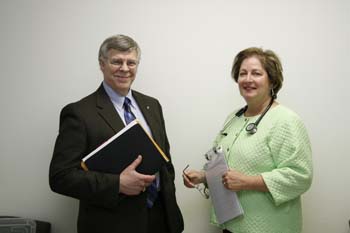| Back to Back Issues Page |
 |
|
VBPM Connection: News from your Doctor's Office November 05, 2013 |
Dear Patients and Friends,The Virginia Beach Premier Medical NewsletterNovember, 2013
If you would like to receive a copy of this free monthly newsletter electronically by email, go to the Newsletter Signup Page on the office website (www.vbpm1.com) and enter your email address in the signup box.
If you have a topic that you would like to see appear in the newsletter, please let us know at gjwarth@gmail.com. Twistle: Ask us about Twistle, a secure email application linking you directly to the office or to your doctor. Get answers to your personal medical questions. Change your appointment. Get your lab or x-ray results. Request prescription refills. Keep us informed. Ask the staff or your physician for more information, or click on the link...Twistle.
Hot Flashes
A new treatment for hot flashes…
There is a new medicine, called Brisdelle, available for women with hot flashes. It is actually a remarketing of an old drug known as paroxetine, or Paxil, in a low dose with a new indication for hot flashes. Paroxetine is an SSRI, which is a class of drugs mostly used as antidepressants. They have been used for years in low doses to treat hot flashes and are fairly effective. Brisdelle is over $100/month, but the generic, paroxetine can be obtained by prescription for about $8/mo. It’s main advantage is that it’s non-hormonal. Women on tamoxifen won’t be able to use it because of a drug interaction. Other nonhormonal options for mild hot flashes include soy, flaxseed and black cohash, but I wouldn’t expect too much from any of them.
A Probiotic to Lower Cholesterol
Cardioviva is a new probiotic that is reported to lower cholesterol levels by about 10%. This certainly wouldn’t take the place of a statin like Zocor (simvastatin), but it may help if you are one of those patients who can’t take statins and you still need to decrease your cholesterol beyond what you can do with your diet. 2 capsules a day will cost about $35/mo.
Cipro and Similar Antibiotics
Quinolone antibiotics (Cipro, Levaquin and Avelox) are some of the most powerful antibiotics that we have. However, they do cause side effects in a small percentage of patients who use them. These include, tendonitis, lethargy or confusion, in some cardiac patients, they may cause an increased risk of certain arrhythmias. They can also interact with other medications like Coumadin (warfarin). Another potential side effect that has been recognized and talked about more recently is that they can cause a peripheral neuropathy – numbness or burning in the feet and hands. This is very rare but can persist for a long time after the drug is stopped in some cases.
NSAIDs vs. Acetaminophen
Many patients want to know what is the safest OTC (over-the-counter) pain reliever they can use for minor pain like headache, arthritic pain, back pain, etc. It usually comes down to ibuprofen (Advil), or naproxen (Aleve), which are NSAIDs vs. acetaminophen (Tylenol).
Acetaminophen is without a doubt the safest pain reliever on the market. There has been a lot of news about the fact that it can cause liver disease or even liver failure, which is true, but only if it’s taken in high doses (over 4 grams/d). If the dose is limited to less than 3 grams (3000mg) per day, the risk is extremely small. Sometimes the acetaminophen is hidden in other medications, however. For example, if you take an OTC cold medicine that contains it and also take Tylenol in addition, you may get too much, so make sure you read the labels and look for the word ‘acetaminophen’ in the ingredients. NSAIDs (Non-Steroidal Anti-Inflammatory Drugs) usually work better for arthritic pain than acetaminophen because of their anti-inflammatory effect, and they are generally safe if they are used in short courses. Sometimes, even then they can cause heartburn, ulcers, bleeding in the gastrointestinal tract, kidney failure, liver disease and fluid retention. They can exacerbate congestive heart failure and hypertension and increase risk of bleeding due to their effect of platelets. Both acetaminophen and NSAIDs can potentially cause severe skin reactions in patients who are allergic to them.
Echocardiograms
Not to be confused with an electrocardiogram (EKG or ECG), which tells about the electrical activity of the heart, an echocardiogram is an ultrasound of the heart that helps the doctor diagnose or rule out structural cardiac problems. It is easy to do in most cases, doesn’t require any needles or dye and gives a lot of information for the doctor about your heart. It can tell how well your heart is contracting, whether there is any enlargement of any of the four chambers of the heart, and whether or not you have any valve abnormalities. It can often tell whether you have had a heart attack in the past that you may not even be aware of. It is truly an indispensible tool for evaluation of patients when any heart problems are suspected.
When you talk with your doctor about the results, the phrase ‘ejection fraction’ (EF) is often used to tell how well your heart is contracting. Normally, the EF is anywhere from 50-70%. If the number is below 50%, this may be an indication of weakness of your heart muscle, perhaps caused by chronic coronary disease, diabetes, hypertension, alcohol and other conditions. If your EF is greater than 75%, that means your heart is contracting more efficiently and perhaps more vigorously than usual, which is not necessarily bad. This could be normal for you, or it could be an effect of medications. The echo may also give information about your heart valves, perhaps indicating a narrowing of one the valve openings, or it may show a leaky valve, in which case the blood sometimes flows backwards instead of forwards. Depending of the severity of these findings, it may help explain the cause of certain symptoms you may be having, like shortness of breath or ankle swelling. Most echocardiograms are done using the transthoracic method – that is, a transducer device is applied to the surface of the chest wall (on the skin) and ultrasound waves go through the chest wall and bounce back. Depending on how fast the waves come back in various positions of the transducer, the depth of different structures can be determined and one can ‘see’ the inner structure of the heart on a screen that can be recorded for the doctor to review. The EF is then determined by how dilated the left ventricle (the main pumping chamber) is when it is full compared to how small the cavity becomes when it is empty (right after a beat). If the size of the cavity reduces by 50% then that is what the EF is. Occasionally a different type of echo is performed when greater detail is needed, especially to look at valve structures, or if there is concern about any infection on one of the valves. This is called a transesophageal echo, which requires that the patient swallow a small probe, which then sits in the middle of the swallowing tube (esophagus) while the echo is being done. Since the probe is inside the body and very close to the heart, a much greater amount of detail can be obtained. Again, no needles or dye are required, but it is somewhat more uncomfortable because of having to swallow the probe. Of course, this probe is removed as soon as the echo is completed. The results of the echo usual take about 24-48 hours to get back after it’s done. It is often useful to compare the results of the new one with the old to see if there are any changes.
Testosterone
There are a lot of ads on TV about men with ‘Low T’, or low testosterone levels. There’s a considerable amount of controversy about the benefits vs. potential side effects.
First, the benefits seem to be few and inconsistent. It may or may not improve strength, sexual function, depression or quality of life. It may slightly reduce body fat. It may be appropriate for men with low morning testosterone levels and symptoms such as profound fatigue, lack of strength or decreased libido. It doesn’t seem to do much for erectile dysfunction in most men. The side effects include breast enlargement, sleep apnea, fluid retention with edema, prostate enlargement, prostate cancer, blood clots in the legs and lungs; and it can raise red cell counts to sometimes dangerous levels causing a condition called polycythemia. I’m not sure it’s worth it. If you do have documented low testosterone levels AND if you are symptomatic because of it, a six month trial might be appropriate. If you don’t notice any improvement in symptoms during that time, it would probably be best stop it, no matter what your 'T' level may be.
Antioxidants
Antioxidants are generally thought to be good for you. They help to neutralize the free radicals, the by-products of cellular metabolism that can potentially contribute to the development or worsening of a number of illnesses. Antioxidants can be found naturally in many plant foods. Tomatoes, beans, corn, cruciferous veggies (cabbage, broccoli, cauliflower, kale, etc.), pomegranate, coffee, tea, berries and curry contain lots of antioxidants. Also, a diet which is rich in plant-based foods like fruits, vegetables, legumes, and whole grains have additional benefits including fiber, protein, vitamins and minerals in addition to antioxidants. There is overwhelming evidence that diets like this offer tremendous health benefits. The supplements that you can buy in health food stores, on the other hand, may or may not be good for you, and there is little real evidence that they are. In fact, the antioxidant vitamin supplements like vitamin E, vitamin A and beta carotene are probably harmful in the doses usually provided in the pill supplements. So, when choosing between dietary antioxidants versus pill supplements, it appears the nutritional diet wins, hands down. Plus, these foods will tend to lower your intake of saturated fats and transfats, which is also a plus. As the saying goes, “You are what you eat”. Here is a recipe for a smoothie containing lots of antioxidants that you might want to try ( I found it in the most recent issue of the Mayo Clinic Health Letter)… Orange Peach Smoothie: Roast and peel the red peppers. Put all ingredients into juicer and process. Pour into 4 frosted glasses and enjoy. Nutrition analysis per 10-oz. serving, or about 1 1/4 cups: 175 calories, 1 gram (g) total fat (trace saturated fat, trace monounsaturated fat), 0 mg cholesterol, 95 mg sodium, 34 g total carbohydrate (5 g dietary fiber), 7 g protein Daily Value analysis per serving: 186% vitamin C, 54% manganese, 46% vitamin A, 9% zinc, 8% copper, 2% vitamin E and selenium; also contains lutein and zeaxanthin (no requirements have been established).
Sinus Congestion
Sinus congestion can interfere with sleep as well as proper breathing and is downright miserable sometimes. It can be caused by a number of different problems like allergies, vascular congestion or infection; and it may last just a few days as with the common cold or it may be chronic as in the case with allergies. Of course, you should check with your doctor for the correct diagnosis and specific treatment or medication that might help you resolve the situation. Here are some common things to do that may help you feel better… ~ Warm compresses to the face. ~ Breathe in steam from a hot shower or pan of hot water. ~ Short term use of nonprescription nasal sprays – Afrin or Neo-Synephrine, but no more than 3 days in a row to avoid the rebound effect. ~ OTC decongestants, but beware these can cause elevation of blood pressure and heart rate and urinary retention in males with prostate enlargement. ~ OTC pain medications like Tylenol (acetaminophen) or Advil (ibuprofen). ~Drink lots of fluids to keep the mucous membranes moist and make it easier to get rid of phlegm. ~ Your doctor may prescribe a nasal steroid spray, which can help provide some relief as well. ~ Antibiotics will generally only be helpful if you’ve had a true sinus infection for more than 7 days or if you’ve had fever, chills, sinus pain or thick purulent sinus drainage. Most milder infections are viral and will not respond to any antibiotic.
Perfume, Pets and Allergies
If you've ever known someone who has allergies, you know that sometimes exposure to certain things like pet dander and perfume can be quite distressing and can even precipitate a severe asthma attack. So, when coming into the office, in order to protect our patients and office staff, please refrain from wearing perfumes and bringing in pets. We will be forever grateful. About Our Office
Virginia Beach Premier Medical is a membership internal medicine practice specializing in comprehensive and compassionate, individualized and personalized patient-centered care. We pride ourselves on full continuity of care – in the office, in the hospital, or even at home.
If you would like more information about our practice please call us at 757-416-6750 or visit our website at www.vbpm1.com. Ask to speak with Brittany, our office manager, or Dr. Parks or Dr. Warth. We’d be happy to talk with you anytime.
|
| Back to Back Issues Page |





